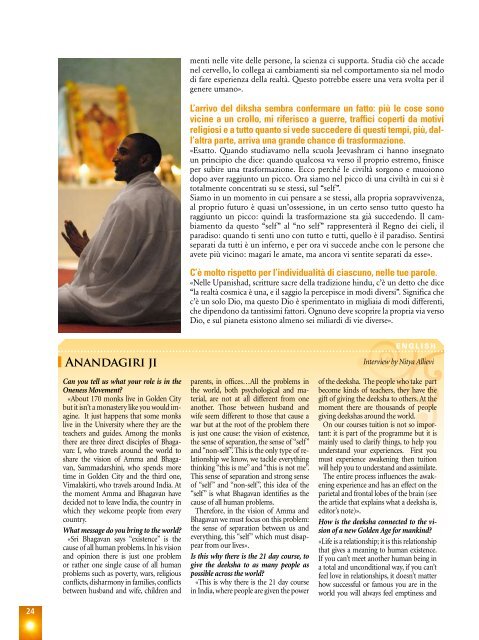Anno II - marzo 2007 - Oneness Meditation Center Treviso
Anno II - marzo 2007 - Oneness Meditation Center Treviso
Anno II - marzo 2007 - Oneness Meditation Center Treviso
Create successful ePaper yourself
Turn your PDF publications into a flip-book with our unique Google optimized e-Paper software.
24<br />
Anandagiri ji<br />
Can you tell us what your role is in the<br />
<strong>Oneness</strong> Movement?<br />
«About 170 monks live in Golden City<br />
but it isn’t a monastery like you would imagine.<br />
It just happens that some monks<br />
live in the University where they are the<br />
teachers and guides. Among the monks<br />
there are three direct disciples of Bhagavan:<br />
I, who travels around the world to<br />
share the vision of Amma and Bhagavan,<br />
Sammadarshini, who spends more<br />
time in Golden City and the third one,<br />
Vimalakirti, who travels around India. At<br />
the moment Amma and Bhagavan have<br />
decided not to leave India, the country in<br />
which they welcome people from every<br />
country.<br />
What message do you bring to the world?<br />
«Sri Bhagavan says “existence” is the<br />
cause of all human problems. In his vision<br />
and opinion there is just one problem<br />
or rather one single cause of all human<br />
problems such as poverty, wars, religious<br />
conflicts, disharmony in families, conflicts<br />
between husband and wife, children and<br />
menti nelle vite delle persone, la scienza ci supporta. Studia ciò che accade<br />
nel cervello, lo collega ai cambiamenti sia nel comportamento sia nel modo<br />
di fare esperienza della realtà. Questo potrebbe essere una vera svolta per il<br />
genere umano».<br />
L’arrivo del diksha sembra confermare un fatto: più le cose sono<br />
vicine a un crollo, mi riferisco a guerre, traffici coperti da motivi<br />
religiosi e a tutto quanto si vede succedere di questi tempi, più, dall’altra<br />
parte, arriva una grande chance di trasformazione.<br />
«Esatto. Quando studiavamo nella scuola Jeevashram ci hanno insegnato<br />
un principio che dice: quando qualcosa va verso il proprio estremo, finisce<br />
per subire una trasformazione. Ecco perché le civiltà sorgono e muoiono<br />
dopo aver raggiunto un picco. Ora siamo nel picco di una civiltà in cui si è<br />
totalmente concentrati su se stessi, sul “self”.<br />
Siamo in un momento in cui pensare a se stessi, alla propria sopravvivenza,<br />
al proprio futuro è quasi un’ossessione, in un certo senso tutto questo ha<br />
raggiunto un picco: quindi la trasformazione sta già succedendo. Il cambiamento<br />
da questo “self” al “no self” rappresenterà il Regno dei cieli, il<br />
paradiso: quando ti senti uno con tutto e tutti, quello è il paradiso. Sentirsi<br />
separati da tutti è un inferno, e per ora vi succede anche con le persone che<br />
avete più vicino: magari le amate, ma ancora vi sentite separati da esse».<br />
C’è molto rispetto per l’individualità di ciascuno, nelle tue parole.<br />
«Nelle Upanishad, scritture sacre della tradizione hindu, c’è un detto che dice<br />
“la realtà cosmica è una, e il saggio la percepisce in modi diversi”. Significa che<br />
c’è un solo Dio, ma questo Dio è sperimentato in migliaia di modi differenti,<br />
che dipendono da tantissimi fattori. Ognuno deve scoprire la propria via verso<br />
Dio, e sul pianeta esistono almeno sei miliardi di vie diverse».<br />
parents, in offices…All the problems in<br />
the world, both psychological and material,<br />
are not at all different from one<br />
another. Those between husband and<br />
wife seem different to those that cause a<br />
war but at the root of the problem there<br />
is just one cause: the vision of existence,<br />
the sense of separation, the sense of “self”<br />
and “non-self”. This is the only type of relationship<br />
we know, we tackle everything<br />
thinking “this is me” and “this is not me”.<br />
This sense of separation and strong sense<br />
of “self” and “non-self”, this idea of the<br />
“self” is what Bhagavan identifies as the<br />
cause of all human problems.<br />
Therefore, in the vision of Amma and<br />
Bhagavan we must focus on this problem:<br />
the sense of separation between us and<br />
everything, this “self” which must disappear<br />
from our lives».<br />
Is this why there is the 21 day course, to<br />
give the deeksha to as many people as<br />
possible across the world?<br />
«This is why there is the 21 day course<br />
in India, where people are given the power<br />
ENGLISH<br />
Interview by Nitya Allievi<br />
of the deeksha. The people who take part<br />
become kinds of teachers, they have the<br />
gift of giving the deeksha to others. At the<br />
moment there are thousands of people<br />
giving deekshas around the world.<br />
On our courses tuition is not so important:<br />
it is part of the programme but it is<br />
mainly used to clarify things, to help you<br />
understand your experiences. First you<br />
must experience awakening then tuition<br />
will help you to understand and assimilate.<br />
The entire process influences the awakening<br />
experience and has an effect on the<br />
parietal and frontal lobes of the brain (see<br />
the article that explains what a deeksha is,<br />
editor’s note)».<br />
How is the deeksha connected to the vision<br />
of a new Golden Age for mankind?<br />
«Life is a relationship; it is this relationship<br />
that gives a meaning to human existence.<br />
If you can’t meet another human being in<br />
a total and unconditional way, if you can’t<br />
feel love in relationships, it doesn’t matter<br />
how successful or famous you are in the<br />
world you will always feel emptiness and


